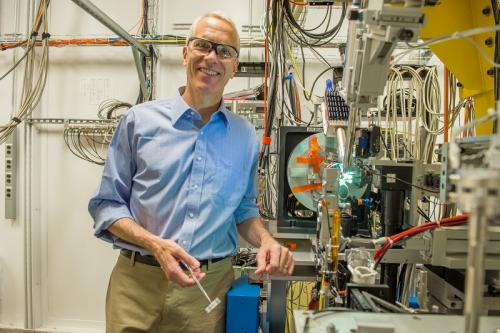Nobel Prize laureate professor Brian K. Kobilka from Stanford University will visit Vilnius University Life Sciences Center on September 26.
1:30 pm professor will deliver a lecture “Structural Insights into G-protein-coupled Receptor Activation” in the Great Auditorium (R106).
G protein coupled receptors (GPCRs) conduct the majority of cellular responses to hormones and neurotransmitters, and are therefore the largest group of pharmaceutical targets for a broad spectrum of diseases. The goal of prof. B. Kobilka’s research over the past 25 years has been to characterize the structure and mechanism of activation of GPCRs. The scientists have applied a spectrum of biochemical and biophysical tools to study different aspects of GPCR structure and activation. Nobel Prize winner will discuss what these studies have taught about allosteric regulation of GPCR structure and function by G proteins and ligands. He will also discuss challenges in GPCR drug discovery, and the potential impact of structural biology and other scientific advances on future drug discovery efforts.
Brian Kobilka, MD, is Professor of Molecular and Cellular Physiology, and Hélène Irwin Fagan Chair in Cardiology, at Stanford University School of Medicine. He received a Bachelor of Science degree in Biology and Chemistry from the University of Minnesota, Duluth, in 1977. He graduated from Yale University School of Medicine in 1981, and completed residency training in Internal Medicine at the Barnes Hospital, Washington University School of Medicine, St Louis, Missouri, in 1984. From 1984–1989, he was a postdoctoral fellow in the laboratory of Robert Lefkowitz at Duke University. In 1990 he joined the faculty of Medicine and Molecular and Cellular Physiology at Stanford University.
Research in the Kobilka lab focuses on the structure and mechanism of action of G-protein-coupled receptors, which constitute the largest family of receptors for hormones and neurotransmitters in the human genome. GPCRs are the largest group of targets for new therapeutics for a very broad spectrum of diseases. In 2012, Kobilka together with Robert Lefkowitz was awarded the Nobel Prize in Chemistry for his work on GPCRs. He is a member of the National Academy of Sciences, the National Academy of Medicine, and the American Academy of Arts and Sciences.

